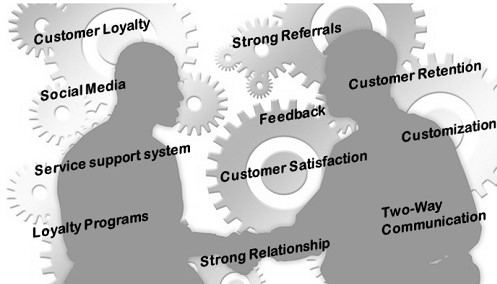Methods like customer retention, customer acquisition, and product development have been used by businesses to drive up sales. So, as a business owner, what approach do you use? Also, have you compared these methods to know which one’s most effective for you? Well, since you’re here, there might be no need for comparison again. According to a survey by KPMG (Klynveld Peat Marwick Goerdeler) on the most significant retail revenue drivers; customer retention tops the list. Hence, let’s discuss relationship marketing because it will help you retain your customers and, hence, drive up sales.
Relationships Marketing Theory
The theory of relationship marketing proposes that businesses can build a loyal customer base by delivering value and providing good customer care. Clearly, this is a long-term strategy for customer retention. because it goes beyond a one-time interaction into a more regular and consistent business-customer interaction.
What Is Relationship Marketing?
Relationship marketing is a marketing method that employs satisfactory product or service delivery and good customer relationships to foster customer retention and engagement. As a result, it has a long-term effect on customers. Thereby fostering customers’ loyalty and sales promotion.
As you already know, customer acquisition and customer retention rival each other among marketers as to which is the best retail revenue driver. But surveys have shown that acquisition costs are higher than retention costs by up to six times. Also, customer retention has a positive effect on customer acquisition because your relationship marketing has established customers that love your product. Hence, they will be willing to promote it to other consumers.
What Are the 4 Basic Elements of Relationship Marketing?
Customer relationship management is made up of four parts: customer satisfaction, customer loyalty, making money, and keeping customers.
Levels of Relationship Marketing
In building a good relationship between itself and its customers; businesses usually go through these five levels or types of relationship marketing. Which progressively becomes more advanced at higher levels.
-
Basic relationship marketing:
The focus here is to get the consumer to know your business. So, your first impression could affect the relationship between you and the consumer.
-
Reactive relationship marketing:
In this level, businesses focus on getting reactions from customers like feedback, comments, etc. On their product or services. For example, Starbucks share their customers’ short videos and images with their product on Instagram. Hence, this incites reactions from customers.
-
Accountable relationship marketing:
Businesses here want to get honest feedback from customers. For example, some E-commerce sites do call their customers on the phone after a purchase to review the product they bought. This fosters a deeper level of relationship marketing.
-
Proactive relationship marketing:
This involves proactive measures taken by businesses to foster a better customer experience. It could involve an analysis of customer feedback and then creating a more engaging product based on the result of the analysis.
-
Partnership marketing:
At this stage, businesses collaborate with others in other to deliver highly enticing products to their customers. Hence, sustaining the interest of their customers.
What Is the Aim of Relationship Marketing?
Relationship marketing is a strategy of Customer Relationship Management (CRM) that focuses on keeping customers, making sure they are happy, and making sure they are worth keeping for the long term. Its goal is to market to current customers instead of using sales and advertising to get new ones.
What Are the 6 Stages in Relationship Marketing?
The customer lifecycle is comprised of six stages: discovery, assessment, purchase, use/experience, bonding, and advocacy.
What Are the 3 Pillars of Relationship Marketing?
The three pillars of relationship marketing are marketing, service quality and personalized customer service
READ ALSO: EXPERIENTIAL MARKETING: ALL YOU NEED TO KNOW (DETAILED GUIDE)
Importance of Relationship Marketing
As a business owner, maintaining a good customer relationship is very important. Because it builds a solid customer base for your business and even more. Below, are some importance of relationship marketing.
-
Improved customer experience:
Every good business realizes that satisfying the customer is as important as making profits. If not more. In fact, some startups forfeit profit just to build a good customer base. An example of this Amazon. So, to last long in business a good customer experience is key. And relationship marketing helps achieve that.
-
Increases referrals from your customers:
This is one of the results of the ripple effect of relationship marketing. So, when your customers’ experience is nice, they’ll like to share it with their friends. Hence, this brings about an increased number of referrals.
-
Dynamic updates on the needs of your customers:
With consistent interactions, feedbacks, and comments with customers. Businesses can update themselves on the current needs of the customers. Hence, make the most of it by solving it and then profiting from it too.
-
New business ideas:
Businesses can have great insight into a new business idea. Secondary to knowing what customers need. Most companies create new ventures post customer feedback analysis. Hence, creating more revenue channels.
-
Solid customer base:
Companies do make mistakes sometimes but still retain their support from their customers. Clearly, this is because of the solid customer base they’ve built through relationship marketing.
What Is the Key Factor in Relationship Marketing?
Relationship marketing also necessitates effective communication. Pay attention to your consumers. They’ll tell you what you’re doing well and where you can improve. To communicate with your consumers, use email campaigns.
What Are the Challenges of Relationship Marketing?
Relationship marketing is challenging because it doesn’t bring in money quickly, each customer costs more, and returning customers have high expectations.
READ ALSO: MARKETING STRATEGIES FOR E-COMMERCE BUSINESS
Examples of Relationship Marketing
Some companies that showed a good example of relationship marketing to learn from are as follows.
Panera:
After receiving complaints from customers about their dislike of artificial flavors, colors, and preservatives in their food. They owned up to their mistakes and vowed to address the issue. Then by 2016, they reported with proof that their product is 100% clean.
Ikea:
When customers voiced their opinion, showing their dislike for the changed font of the company’s catalog. They didn’t overlook the complaint. Instead, the issue was addressed, and everyone was happy.
Vyvanse:
This popular ADHD drug company showed a good example of relationship marketing. By creating an interactive platform for their clients. Hence, not only relying on the strength of the drug to keep its brand. But also, on the strength of the community to help foster its relevance.
Starbucks:
By sharing their customers’ experiences on their Instagram page. They create a deep sense of involvement with their customers. Hence, the later will like to share their experience with friends. Therefore, increasing referrals to Starbucks’ products
Conclusion
Considering the many benefits of relationship marketing, adding it to your arsenal of strategies shouldn’t be a bother. But, besides adding, you would also need implementation. Because just adding won’t get you the results.






